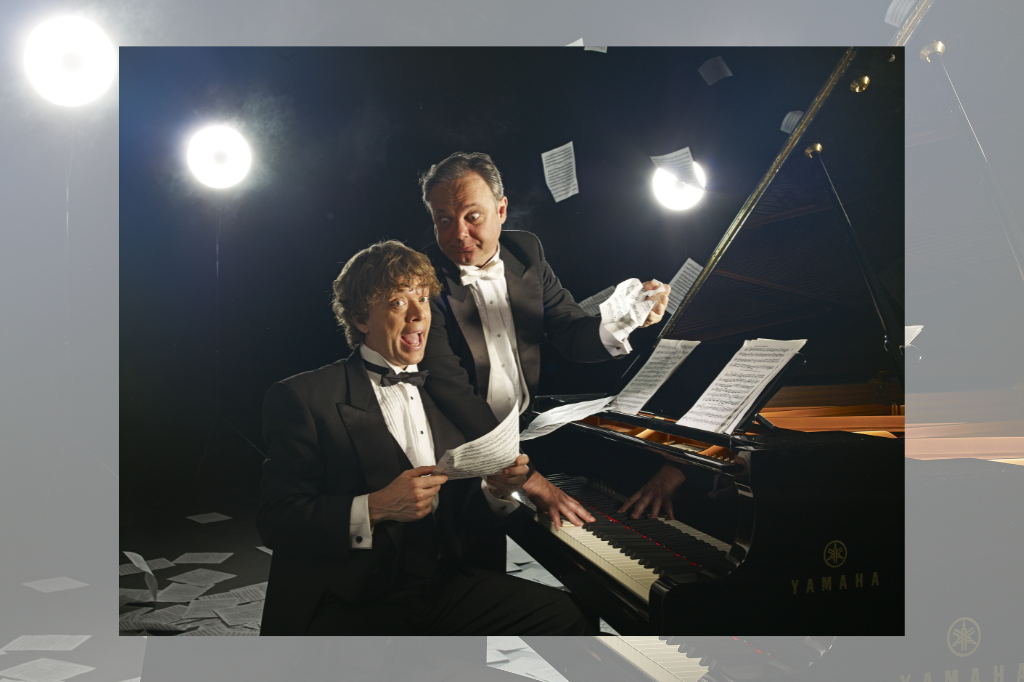REVIEW: 2 Pianos 4 Hands at Mirvish
The Mirvish iteration of 2 Pianos 4 Hands might more aptly be called 2 Pianos 4 Hands 30 Years — for that’s (nearly) how long Ted Dykstra and Richard Greenblatt have been performing it. In existence since 1994, it’s a much-revived project and for good reason: 2 Pianos 4 Hands is a down-to-earth, low-stakes comedy, but it’s so sharp and polished that it feels right at home in the glittering Royal Alexandra Theatre.
Dykstra and Greenblatt grew up as uber-talented pianists, kids with the privilege and heavy-handed parentage that led to relative success as teenage musicians. 2 Pianos 4 Hands is a funny recollection of childhood piano lessons: endless practice sessions, screaming fights with parents who thought they knew better, mythic piano teachers with endlessly imitable accents and mannerisms, Saturdays wasted at Kiwanis Festival.
About that last thing: Kiwanis Festival is a musical competition infamously staffed by volunteers who, to a young person, seem to be about a hundred years old. Competition classes are often ginormous, held in the dampest of church basements across the country, and they seldom run to schedule. If audience reactions at the opening matinee were any indication, Dykstra and Greenblatt’s collage of musical memories was relatable: Kiwanis Festival really is a shared rite of passage for young, Canadian musicians, regardless of what they go on to do with their lives.
And then there’s the music. Dykstra and Greenblatt might only be “the best pianists in the neighbourhood” (as opposed to the world or even the city), but they’re still pretty damn good. Mozart, Bach, and Beethoven form the bulk of 2 Pianos’ repertoire, and the setlist is impeccably played. Billy Joel’s “Piano Man” offers a respite from an otherwise all-classical performance, and it’s quite the crowd pleaser.
The set is simple aesthetically, just two gleaming grand pianos centre stage (production design is by Steve Lucas). There’s a projection screen behind each piano, and the projections are fine, if a bit thin. I found myself missing visualizations of the music being dissected, the flags of the eighth notes, the complexities of the page turns which so challenged young Dykstra and Greenblatt. Projections of hellfire are amusing on first appearance, but they get a little tired — there was more room to explore here.
Simplicity in visual design aside, 2 Pianos 4 Hands is a good-natured, nostalgic romp through the trials of achieving greatness in musical performance. Dykstra and Greenblatt’s questions of being good enough, caring enough, wanting it enough, are authentic and charming; both have gone on to do incredible things in theatre, often involving pianos, if not in the ways they imagined as young boys. Dykstra is a founding member of Soulpepper Theatre, and Greenblatt, after graduating from McGill’s Conservatory of Music, also went on to have an illustrious theatrical career — both have worn numerous hats within the theatre industry, and often involving music in some way. Rejection from piano programs of choice must have stung in the moment — these memories are quiet and contemplative when recreated by Dykstra and Greenblatt onstage — but with time has come perspective, and even gratitude for the forced change in life trajectory.
After thirty years, there’s nary a sour note to be found in 2 Pianos 4 Hands. And while it’s likely not going to be the most profound piece of theatre to hit Toronto this summer, it’s a joyful celebration of youth and the music made during it — who could say no to that?
2 Pianos 4 Hands runs at the Royal Alexandra Theatre through July 17. Tickets are available here.















Comments